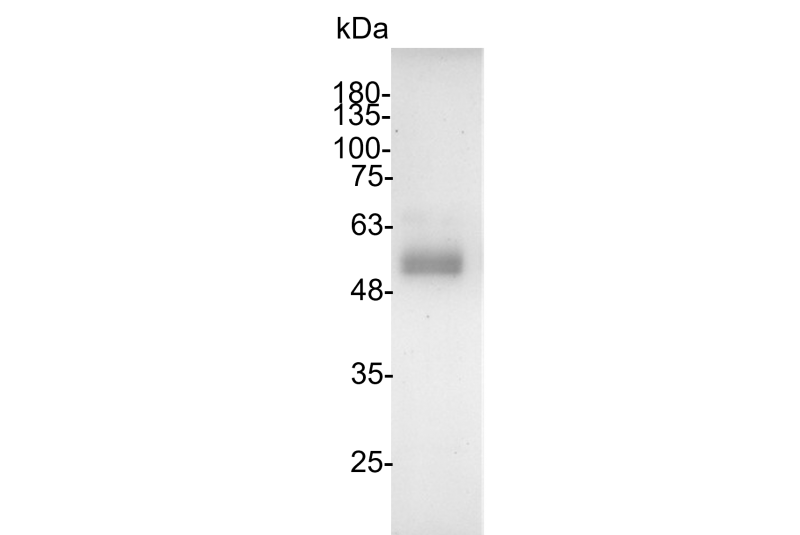Human IGFBP7, His-SUMO Tag, HEK293
SSDTCGPCEPASCPPLPPLGCLLGETRDACGCCPMCARGEGEPCGGGGAGRGYCAPGMECVKSRKRRKGKAGAAAGGPGVSGVCVCKSRYPVCGSDGTTYPSGCQLRAASQRAESRGEKAITQVSKGTCEQGPSIVTPPKDIWNVTGAQVYLSCEVIGIPTPVLIWNKVKRGHYGVQRTELLPGDRDNLAIQTRGGPEKHEVTGWVLVSPLSKEDAGEYECHASNSQGQASASAKITVVDALHEIPVKKGEGAEL with polyhistidine-SUMO tag at the N-terminus
UnitProt ID:
Q16270
Source
HEK293
Endotoxin Test
<1 EU per 1 μg of the protein by the LAL method.
Purity:
>95% as determined by SDS-PAGE.
Form:
Lyophilized
Storage Buffer:
Lyophilized from a 0.2 μm filtered solution of PBS, pH 8.0.
Reconstitution:
It is recommended to reconstitute the lyophilized protein in sterile H₂O to a concentration not less than 200 μg/mL and incubate the stock solution for at least 20 min to ensure sufficient re-dissolved.
Stability & Storage:
This product is stable after storage at:
• -20°C for 12 months in lyophilized state from date of receipt.
• -20°C or -80°C for 1 month under sterile conditions after reconstitution.
Avoid repeated freeze/thaw cycles.
Shipping Conditions:
Blue ice
Synonym
IBP7, IGFBP7, IGF binding protein 7, MAC25 protein, IGFBP-rP1
Background Information
The full name of IGFBP7 is Insulin-like growth factor-binding protein 7.
IGFBP7, a member of the IGFBP family, is found in colorectal adenocarcinoma (CRC) cell lines and serves as a carrier protein for insulin-like growth factor 1 (IGF-1). All IGFBP family members share regions with strong homology and bind IGF-1 and IGF-II with equal affinity. IGFBPs can enhance or inhibit the action of IGF, or act in an IGF-independent manner in the prostate. In RKO and SW620 cells, IGFBP7 inhibits cell growth, decreases soft agar colony formation activity, and induces apoptosis. Evidence suggests that the structure of IGFBP proteins plays a crucial role in regulating IGF bioavailability by modulating its molecular size, capillary membrane permeability, target tissue specificity, cell membrane adherence, and IGF affinity.
Related Product
→ IGF-I (Insulin-like growth factor-I), Human
→ IGF-II (Insulin-like growth factor-II), Human
Recommend Service
→ Mammalian Cell Protein Expression Service
→ E. coli Protein Expression Service

